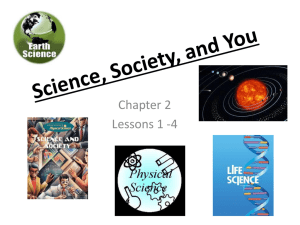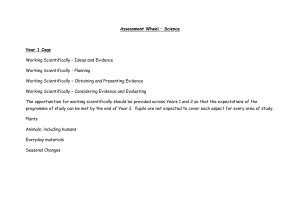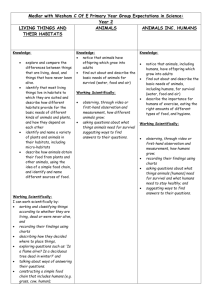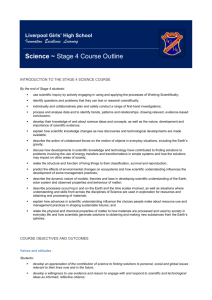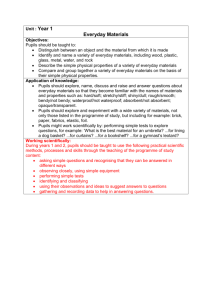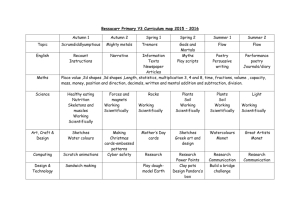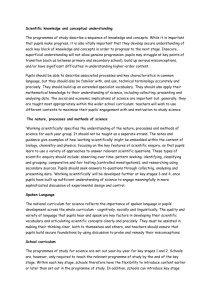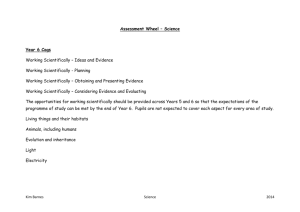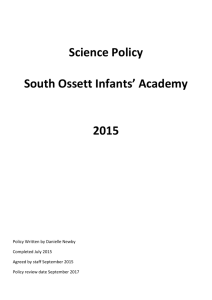Science info for website - New Longton All Saints` School
advertisement
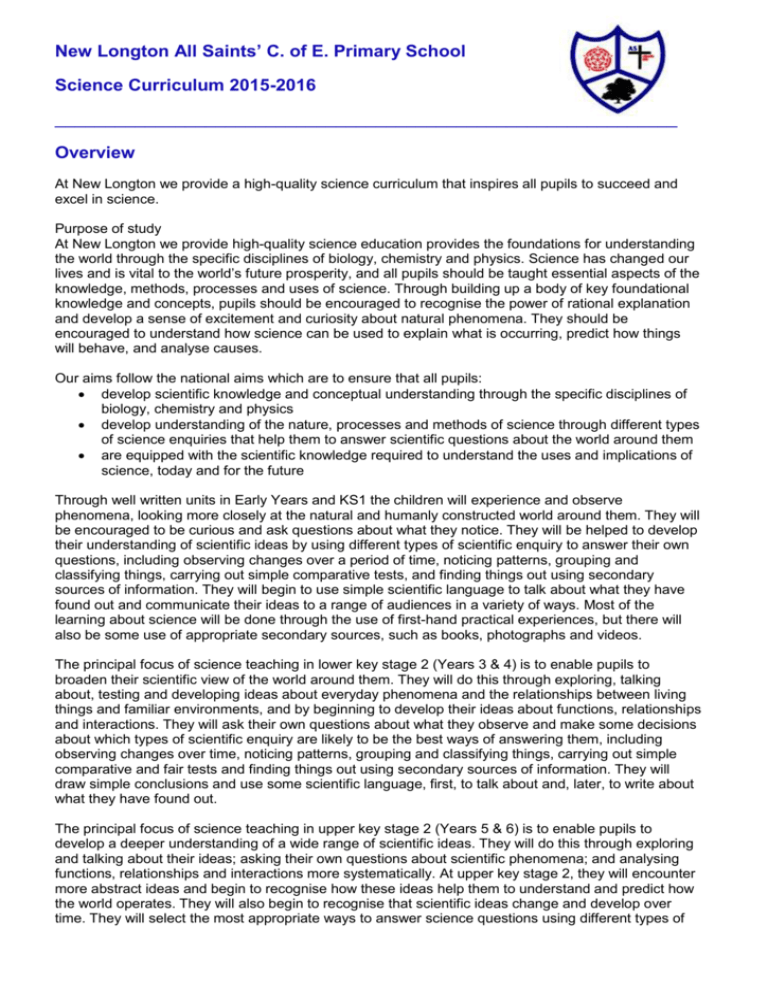
New Longton All Saints’ C. of E. Primary School Science Curriculum 2015-2016 ______________________________________________________________ Overview At New Longton we provide a high-quality science curriculum that inspires all pupils to succeed and excel in science. Purpose of study At New Longton we provide high-quality science education provides the foundations for understanding the world through the specific disciplines of biology, chemistry and physics. Science has changed our lives and is vital to the world’s future prosperity, and all pupils should be taught essential aspects of the knowledge, methods, processes and uses of science. Through building up a body of key foundational knowledge and concepts, pupils should be encouraged to recognise the power of rational explanation and develop a sense of excitement and curiosity about natural phenomena. They should be encouraged to understand how science can be used to explain what is occurring, predict how things will behave, and analyse causes. Our aims follow the national aims which are to ensure that all pupils: develop scientific knowledge and conceptual understanding through the specific disciplines of biology, chemistry and physics develop understanding of the nature, processes and methods of science through different types of science enquiries that help them to answer scientific questions about the world around them are equipped with the scientific knowledge required to understand the uses and implications of science, today and for the future Through well written units in Early Years and KS1 the children will experience and observe phenomena, looking more closely at the natural and humanly constructed world around them. They will be encouraged to be curious and ask questions about what they notice. They will be helped to develop their understanding of scientific ideas by using different types of scientific enquiry to answer their own questions, including observing changes over a period of time, noticing patterns, grouping and classifying things, carrying out simple comparative tests, and finding things out using secondary sources of information. They will begin to use simple scientific language to talk about what they have found out and communicate their ideas to a range of audiences in a variety of ways. Most of the learning about science will be done through the use of first-hand practical experiences, but there will also be some use of appropriate secondary sources, such as books, photographs and videos. The principal focus of science teaching in lower key stage 2 (Years 3 & 4) is to enable pupils to broaden their scientific view of the world around them. They will do this through exploring, talking about, testing and developing ideas about everyday phenomena and the relationships between living things and familiar environments, and by beginning to develop their ideas about functions, relationships and interactions. They will ask their own questions about what they observe and make some decisions about which types of scientific enquiry are likely to be the best ways of answering them, including observing changes over time, noticing patterns, grouping and classifying things, carrying out simple comparative and fair tests and finding things out using secondary sources of information. They will draw simple conclusions and use some scientific language, first, to talk about and, later, to write about what they have found out. The principal focus of science teaching in upper key stage 2 (Years 5 & 6) is to enable pupils to develop a deeper understanding of a wide range of scientific ideas. They will do this through exploring and talking about their ideas; asking their own questions about scientific phenomena; and analysing functions, relationships and interactions more systematically. At upper key stage 2, they will encounter more abstract ideas and begin to recognise how these ideas help them to understand and predict how the world operates. They will also begin to recognise that scientific ideas change and develop over time. They will select the most appropriate ways to answer science questions using different types of scientific enquiry, including observing changes over different periods of time, noticing patterns, grouping and classifying things, carrying out comparative and fair tests and finding things out using a wide range of secondary sources of information. Pupils will draw conclusions based on their data and observations, use evidence to justify their ideas, and use their scientific knowledge and understanding to explain their findings. We provide opportunities for pupils to become physically confident in a way which supports their health and fitness. Opportunities to compete in sport and other activities build character and help to embed values such as fairness and respect. As a Lancashire school we are guided by their scheme of work enhanced by specific dance units that link closely to our creative topics. Scheme of Work KS1and Early Years Year R Year 1 Year 2 Autumn 1 Why Do You Love Me So Much? Autumn 2 How many colours in the rainbow? Animals (including humans); Working Scientifically Everyday Materials Seasonal Changes Forces Working Scientifically Everyday Materials Spring 1 Can I have a dog yet? How does that building stay up? Properties of everyday materials; Working scientifically Sound Spring 2 Why can’t I have chocolate for breakfast? Are eggs alive? Seasonal Changes Plants Working Scientifically The Importance of Exercise Summer 1 Did dragons exist? Summer 2 Why do spiders eat flies? Can we explore it? Am I the fastest? Plants and animals; identifying and classifying Living Things and their Habitats Animals (including humans); Working Scientifically Living Things and their Habitats Use of Everyday Materials Animals, including Humans Working Working Scientifically Scientifically KS2 Autumn 1 Rocks and soils Autumn 2 Year 3 Year 4 States of matter Sound Working scientifically Spring 1 Food chains Fossils Plant parts and functions Water transportation In plants Skeletal systems Working scientifically States of matter Spring 2 Food and Nutrition Summer 1 Plants Light Working scientifically Summer 2 Forces and magnets Working scientifically Teeth types Living things and their habitats Electricity Tooth decay and hygiene Animals and The digestive system Working scientifically Year 5 Year 6 Earth & Space; Forces; Working Scientifically; famous Scientists (History) Light Explain how light behaves and travels in straight lines; how this explains why we can see objects and how shadows are formed, using an appropriate model or diagram. Living Things and their Habitat Working Scientifically; Living things Discrete Living Things and their Habitats Humans Working scientifically Animals (inc Humans); Living things & their habitats; working scientifically Classification; Families and Inheritance; Working Scientifically Identifying Parts of the Circulatory System; Blood and its Functions; Heart Rates; Effect of Drugs, Diet and Exercise; Working Scientifically How Light Travels; Shadows; Electrical Circuits; Using Circuit Symbols; Working Scientifically Assessment We are in the process of assessing to end of year objectives based on the end of key stage statements within the various aspects of the Science curriculum. The children will be assessed as either emerging, expected or exceeding their end of year group objectives.
